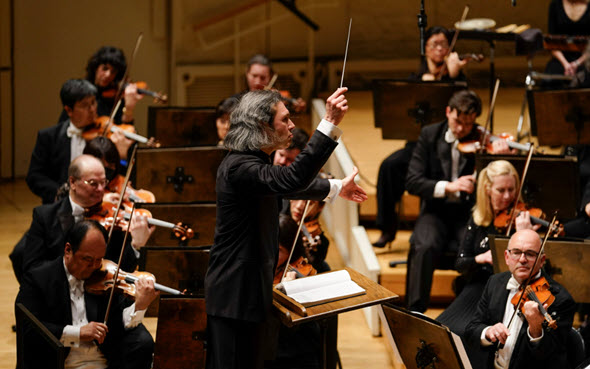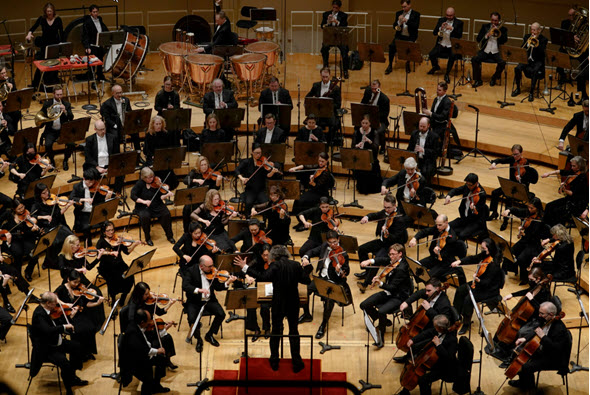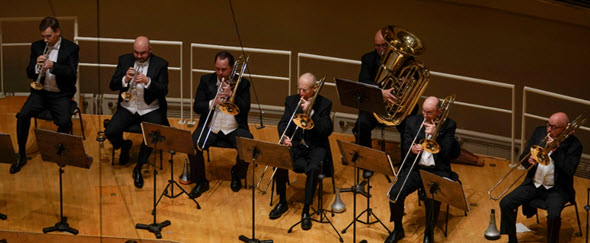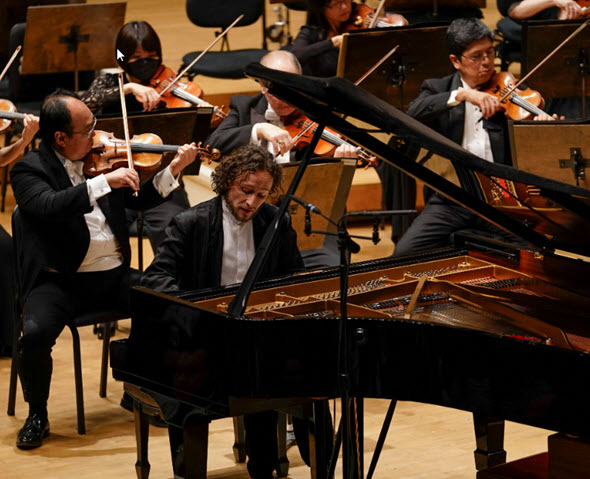Russian conductor takes up Shostakovich 8th, leading CSO deep into a complex spiritual web

Russian conductor Vladimir Jurowski led the CSO in Shostakovich’s Symphony No. 8 in C minor. (Todd Rosenberg photos)
Review: Chicago Symphony Orchestra conduced by Vladimir Jurowski; Martin Helmchen, piano. April 27 at Orchestra Hall.
By Lawrence B. Johnson
Dmitri Shostakovich’s epic and tumultuous Symphony No. 8 in C minor, composed in 1943, might be viewed as Volume 2 of his tomes of war, coming straight after the likewise sweeping and similarly fraught Symphony No. 7 in C major written the year before. But if the Seventh, inspired by and composed during the German siege of Leningrad, is expressly about the war, the Eighth might be said to transcend its circumstances and to echo the dreadful realities of both the enemy at the gates and the oppressors within. One of Shostakovich’s most compelling works, elegantly wrought and spiritually complex, the Eighth Symphony received a sublime and penetrating performance by the Chicago Symphony Orchestra and Russian conductor Vladimir Jurowski.
The Eighth Symphony is laid out much like Beethoven’s “Pastoral” Symphony — in five movements played as three, its last three movements strung together without a break and spanning some 30 minutes, or a bit less than half the length of the entire work. One might argue that the drumbeat and urgency of the opening chapter’s sequence of Adagio-Allegro non troppo-Adagio, followed by a genuinely ferocious scherzo, essentially sets up the real drama and crux of the Eighth Symphony: that sprawling seamless triptych where the collective angst of the time becomes transmuted into something distinctly personal and profoundly dark.
And still there’s light at the end of this bleak passage, though we must be given pause and cause to believe it. That was Jurowski’s ultimate triumph in an account that seemed to arise not from the score but from a native place within the conductor. Without egregious gestures and any hint of histrionics, Jurowski fashioned a riveting performance of the Eighth Symphony at once grand and intimate and precise. Everything sprang from the tip of a well-modulated baton.
Sprang, that is, from a disciplined, responsive and virtuosic orchestra that created impressions as forcible in their subtlety as they were fearsome in their brilliance. The Eighth follows a grand albeit minutely inflected arc, opening with low strings alone to establish a quietly charged dramatic baseline; from there, Shostakovich assembles his profile of chaos and distress through erupting brass set against the ironic incursions of woodwinds. Jurowski shaped the work with the adroitness and certitude of an artist with a clear vision and one who comprehends his medium through and through.
The silence after the second-movement scherzo is charged indeed. At that point, we are halfway through the symphony, or let’s say through the first act of this grinding drama in two acts. Great second acts make great plays, and Shostakovich is about to immerse us in the masterful conclusion of his shattering theater without words. Jurowski, ever the understated figure on the podium, drew ferocious playing from the CSO through the driving music that begins the symphony’s second half; and he sustained that intensity, if not the ferocity, across an ensuing series of variations over a recurring motif in the low strings — a numbing treadmill effect against animated variations in a vast panoply of instrumental colors.
In the end, Shostakovich allows light to break through, muted perhaps but unequivocally serene. Here, we really are in the pastoral realm of the Beethoven Sixth — perhaps not so far in spirit from the exuberant variations that set an unexpected cap to Beethoven’s monumental “Eroica.” The darkness and terror of the Eighth Symphony give way to the grace of hope, and Jurowski went there with conviction and eloquence. It was a deeply affecting finish.
After this extraordinary Shostakovich, the solitary work on the concert’s first half, Mozart’s Piano Concerto No. 25 in C major with soloist Martin Helmchen, felt like something that happened the week before. In fairness, Helmchen turned in a sparkling, infectious performance and Jurowski was a sensitive collaborator for a concerto that bears the structural look of a symphony. The CSO, reduced to proportions that seemed small even for a chamber orchestra, made an agile and burnished contribution.




